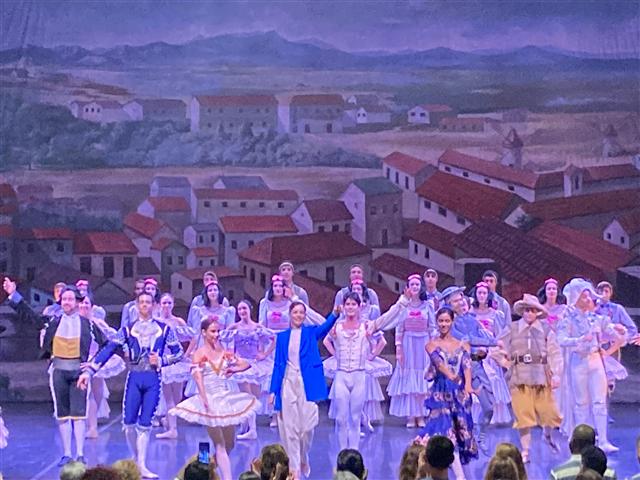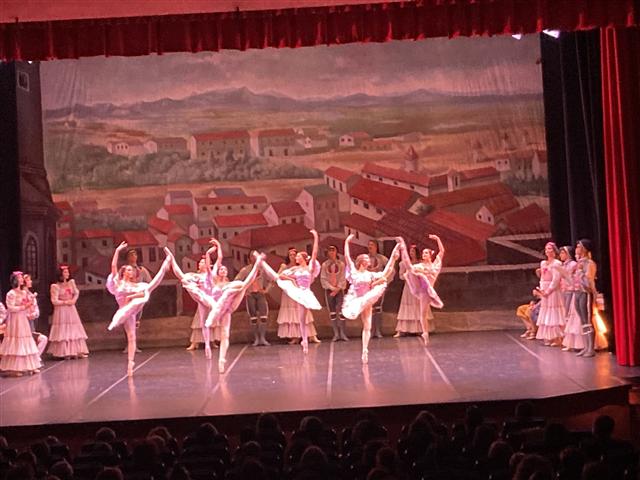Heiress to a throne with many names of her own in the past, Viengsay Valdés, director of the Ballet Nacional de Cuba (BNC), said today that the company has stories to write.
In an exclusive interview with Prensa Latina, the prima ballerina said that the BNC’s background, the figure of Alicia Alonso, the Four Jewels and a trail of international successes are permanent challenges.
Success has smiled on him again on the BNC’s tour of Spain and Portugal, precisely in 2024 when Viengsay celebrates 30 years of career, 10 years after starring in Celeste, by the Colombian-Belgian dancer and choreographer Anabelle López Ochoa.
She will have her tribute in Havana, with a very special gala at the Sala Avellaneda of the Teatro Nacional, as was done in the 1980s with the Cuatro Joyas (Josefina Méndez, Loipa Araujo, Mirta Plá and Aurora Bosch), reminded her of the BNC’s professor and press officer, Ahmed Piñeiro Fernández.
«We are happy to be almost at the end of a tour of Spain and Portugal that has lasted almost two months, with resounding success in every city and theatre, a full house, with many ovations and bravos, from an audience that places us in Spain in melancholy and pleasure for their receptivity», confessed the director of the BNC.
They welcome us, they love us, they are attentive to our performances, and for an artist, this is the best recognition, she added.
Asked by Prensa Latina about the experience in 2023, when cultural life really returned to normal in Spain after the pandemic, she pointed out that they did things differently.
«We were a little daring, showing another part of the BNC’s repertoire, bold proposals within the company’s own versatility, the new youthful airs, without neglecting the classics that we are always asked for, such as Giselle, Don Quixote, Swan Lake,» he said.
Viengsay highlighted the neoclassics adapted to the BNC, which for some of the Spanish audience was a surprise, well received, such as Beethoven’s 7th Symphony with a ballet by Uwe Scholz; Three Preludes by Ben Stevenson and Concerto de SCH.
In addition, Majísimo, by Cuban choreographer Jorge García premiered in 1965, another success card.
He explained that in 2024 the BNC concentrated more on Don Quixote and Giselle, with an exceptional reception in Seville, Toledo, Santander and, in a very special way, in Lisbon, Portugal, where they had not performed for 25 years.
«We have remained respectful of the classics because they are part of our hallmark, but the versatility of our dancers, the very imprint that Alicia left us, the theatrical and dramaturgical studies, allow us to broaden our horizons based on the strength that the Cuban School of Ballet gives us,» she said.
In response to another question from Prensa Latina, Viengsay considered that the company remains faithful to the dance principles «that Fernando Alonso instilled in us, genuine in our profiles, but in a dynamic that seeks spaces, rescuing everything that is valid and at the same time venturing into the neoclassical and current trends».
For the rest of the year, he noted that the BNC has very exciting projects, such as the world premiere of Lucile, by Johan Kobborg, Danish dancer and choreographer, a ballet inspired by the legendary Danish dancer Lucile Grahnde.
«Thanks to the support of the group we call British Friends, who are always looking for the possibility of a world premiere, now in the July season at the Sala Avellaneda of the Teatro Nacional.
After that, a tour of Costa Rica, plus all the preparation involved in the 28th edition of the Alicia Alonso International Ballet Festival of Havana,» he said.

On the more distant horizon, he told Prensa Latina that in 2025 the BNC hopes to return to Europe, perhaps to France and Italy, «although we never rule out Spain».
Dance is intrinsic to Cubans, who with great pedagogical training, a tradition born since the founding of the BNC in 1948, achieve an expressiveness that identifies us and hence the diversity of companies and groups that represent us in the world, he concluded.




